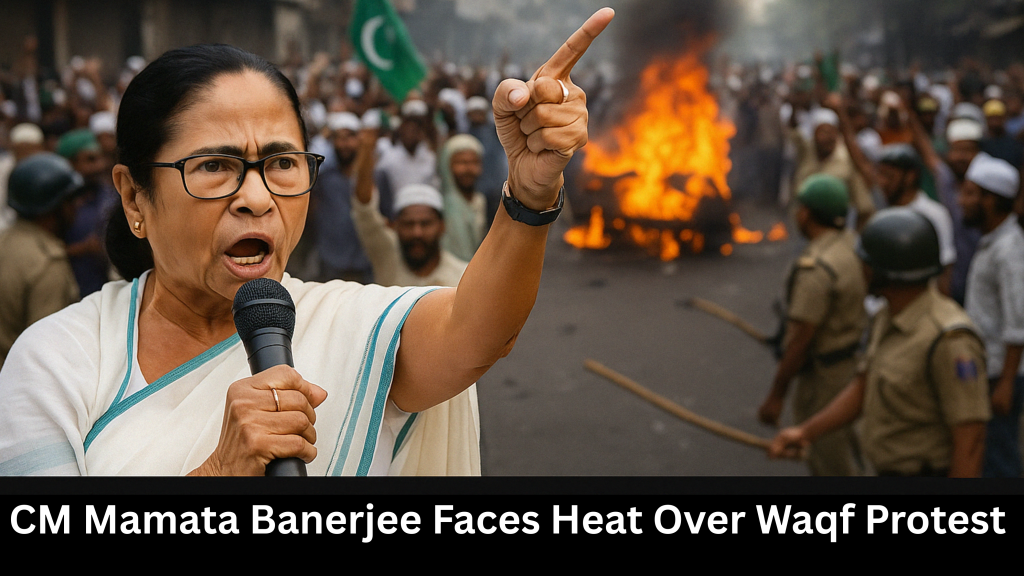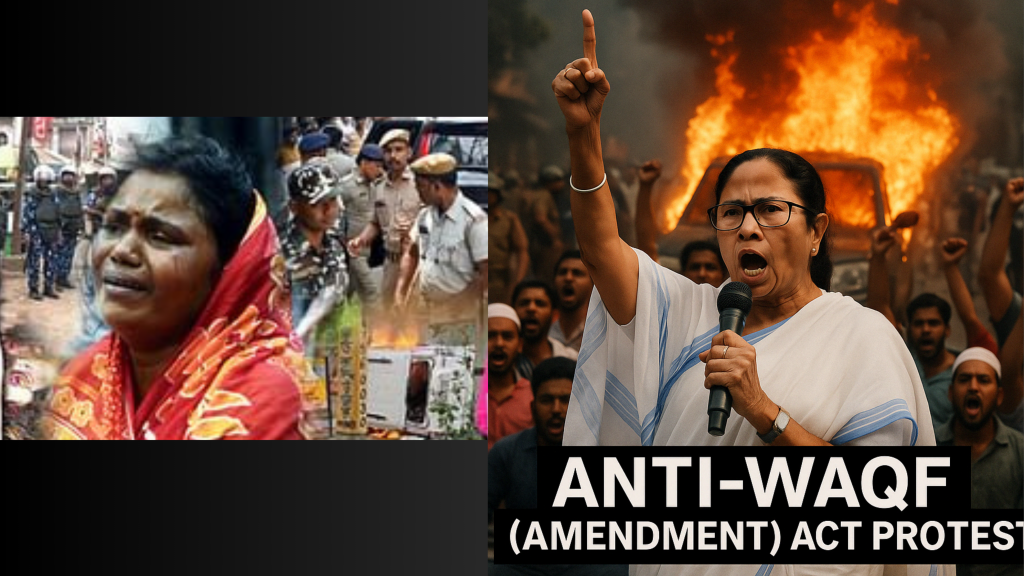
Background on the Waqf (Amendment) Act, 2025
The Indian Parliament passed the Waqf (Amendment) Act, 2025, with the stated aim to plug gaps in the management of Waqf assets. Union Minister Kiren Rijiju has said that the act is not anti-Muslim but is rather aimed at curbing illegal occupation or acquisition of land in the name of religious endowments. As per Rijiju, it is intended to prevent a person from “forcibly and unilaterally” taking another person’s land using the Waqf board.
Protests and Violence in Murshidabad and Elsewhere
Protests turned violent across West Bengal after the law was passed — most notably in the state’s Murshidabad and South 24 Parganas districts. Furious crowds damaged shopping centers, burned cars, fought police, and even attacked a Hindu home, killing at least three people and wounding many more. Bombs were thrown, buildings were flushed, and many people became homeless.
Statement given by CM Mamata Banerjee
West Bengal CM Mamata Banerjee has publicly chastised the national government for rushing through Waqf reform. She asked the center, “Why were you in such a hurry?” during an imam’s meeting. She also described Bengal’s politically unstable geopolitical terrain, which includes borders with Bangladesh, Nepal, and Bhutan.
Allegations of closed-door meetings between the Indian government and Bangladesh’s Yunus government fueled anger, according to Banerjee. West Bengal Chief Minister Mamata Banerjee has publicly criticized the national government for rushing through the Waqf reform. She hinted that some outside powers were used to instigate riots through agencies that helped with illicit mobility across borders. She blamed Union Home Minister Amit Shah for the “misuse” of central agencies and called the violence a “conspiracy.”
Allegations of Inciting Violence
Union Minister Kiren Rijiju accused Mamata Banerjee of visibly inciting violence by publicly refusing to implement a law passed by Parliament. He argued that as a constitutional authority, she is duty-bound to follow and implement constitutional laws, not protest against them.
According to Rijiju, her appeals to the public to oppose the act and statements about non-compliance were akin to encouraging rebellion and unrest. He further expressed concern over possible involvement of anti-national and anti-social elements.
Political Backlash: BJP’s Aggressive Criticism
The Bharatiya Janata Party (BJP) launched an aggressive campaign blaming the Trinamool Congress (TMC) and Mamata Banerjee for the unrest. Actor-turned-politician Mithun Chakraborty accused Banerjee of inciting communal tensions and labeled her a threat to Bengali Hindus. He claimed that the chief minister was misleading Muslims and encouraging religious divide.
BJP spokesperson Pradeep Bhandari claimed that Mamata’s close aide, Minister Siddiqullah Chowdhury, emboldened the mobs by saying he had the CM’s backing. Bhandari also accused Banerjee of targeting Hindu sentiments, alleging she had referred to Sanatan Dharma as a “bad religion.” He claimed the state was being used as a “lab for appeasement politics.”
Security And Judicial Measures
Due to the widespread nature of the violence, the Calcutta High Court intervened, directing the deployment of central forces to restore peace. The state government suspended internet services in volatile areas and imposed Section 144 to control crowds and limit further violence.
Despite intelligence inputs and signs of growing tension, critics claim the state police failed to act decisively in time. This has led to accusations that the state administration was either complicit or neglectful.

Narrative War and Communal Polarization
The entire episode has turned into a political and communal flashpoint. While the BJP accuses the TMC of appeasement politics and failing to protect Hindus, Banerjee blames the center for political vendetta, using the Waqf Act as a tool to provoke unrest and disturb state harmony.
Impact and Current Situation
The violence has resulted in loss of lives, property damage, displacement of hundreds, and the deployment of central security forces. The communal tension continues, with no sign of reconciliation between the state and the center. The Waqf Act has become not just a legislative issue but a symbol of political power struggle, religious sentiments, and federal defiance.

